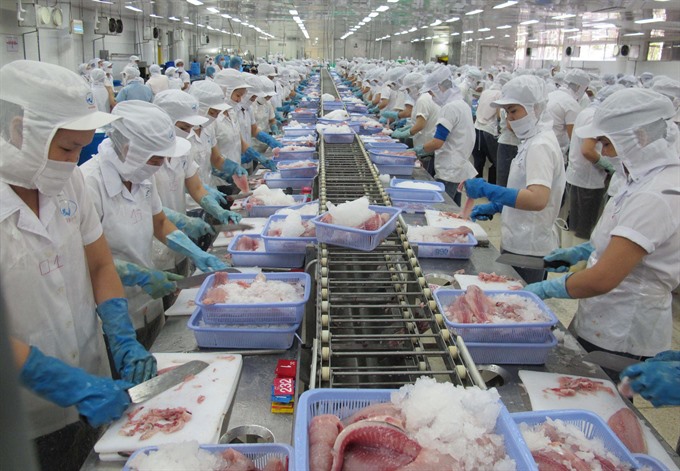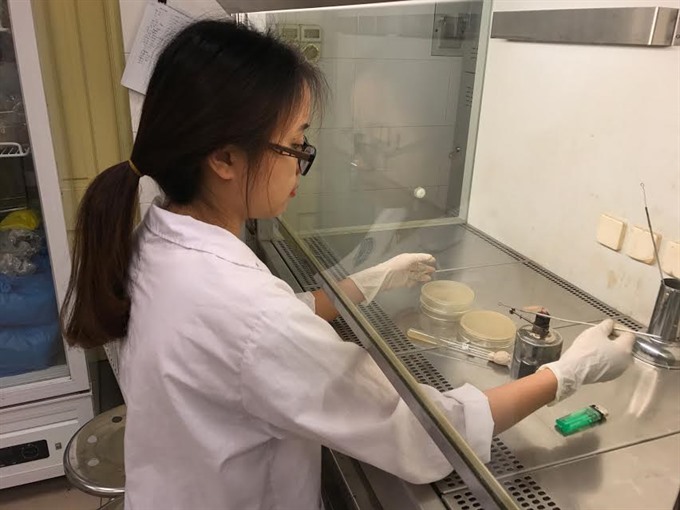 |
| By product: Anh’s research opens the door for creating by-products from the aquaculture industry. Viet Nam is one of the leading fish exporters in the world. VNA/VNS Photo Phuong Vy |
Viet Nam News
by Hong Van
Newly appointed biology teacher Vu Thi Mai Anh won first prize in food technology at Eureka 2017, a contest for research and technology students on the use of basa catfish fat for producing environmentally-friendly bio-plastics.
However, Anh told Viet Nam News that while she would like to continue her research at her present school, it had no laboratory facilities.
"I feel sorry that I can’t continue my work and make it reality. However, I believe students can use my work for reference and further study on the subject," she said.
Anh’s research theme about selecting bacteria to convert fat from basa catfish into bioplastics, specifically polyhydroxyalkanoate (PHA), opens the door for the production of biodegradable plastic products from basa fish fat, which comprises about 25 per cent of each fish..
Bioplastics are not harmful to any living organisms or tissues. Thus, they can be utilised in a variety of medical applications, including as thread for surgerical sutures and endovascular (venous) stent graft. It can be also used to make durable products such as parts for electronics - and mobile phone and laptop caseds and covers.
This was the first research on the use of fat - and basa fish fat in particular - in producing biopolymers (PHAs) in Viet Nam.
"This will open prospect for new applications of by-products of the fisheries industry. This study is especially meaningful when Viet Nam is among the leading fish exporters in the world,” Mai Anh said.
Anh was a biology major at the Ha Noi University of Pedagogy and is now biology teacher at the Minh Ha high school in the northern province of Quang Ninh.
Her instructor, deputy head of biology at the Ha Noi University of Pedagogy, Doan Van Thuoc, said: “The research opens up the prospect for manufacturing environmentally friendly bioplastics in Viet Nam. The author should conduct further research to help production companies.”
Bio-plastics (PHA’s) are much safer for the environment than conventional plastics which are usually made from petroleum. PHAs decompose when they are exposed to soil and water and therefore cause no harm to the environment.
They are similar to conventional plastics in that they are not conducting electricity and heat and are water resistant, therfore they can be used to replace conventional plastics.
PHAs are polyesters produced in nature by numerous micro-organisms, often through bacterial fermentation. This enables them to be used as both a source of energy and as a carbon store.
 |
| Dedicated: Vu Thi Mai Anh spent most of time in a university laboratory while conducting research on the use of basa fish fat to produce bio-plastics. — Photo courtesy of Anh |
In her research, Anh used basa fish fat, which has great potential as a carbon source for PHA production.
At first, she had to find micro-organisms available in soil, then analyse their biological characteristics. When she find the strain she wants, she makes a culture with basa fish fat to converts it into PHAs.
Anh worked in a laboratory when she was in second year at university. It took her three months to become familiar with laboratory experiment procedures. Her instructor, Prof Thuoc, guided her and suggested the topic for research. It took her a total of two years to complete the work.
“The biggest challenges were difficult experiments requiring much precision. I had to conduct the experiments over and over again to find what I was looking for. Each would last up to a week.
The last experiment was the toughest. Anh had to conduct a fermentation process in a 10-litre pan. She had to do it four times, taking a week for each step. “I spent most of my time in the laboratory. It was tiring but fun time,” she said.
“I feel grateful for the dedicated instructions given by Prof Thuoc and other academics,” she added.
“When I was at high school, I often watched videos on biological and chemical experiments. I would always ask teachers to let me get involved in experiments. I had a great sense of curiosity for lab experiments and found them exciting,” she said.
When Anh entered university, she became leader of an experiment team. “It’s said teacher and medical doctor are the two most respected professions. One takes care of knowledge and cultural life, while the other cares for health. I chose both majorswhen registering for university," she said.
“Biology is the science of life. Life is magical. In biology, I have chance to see the most tiny things cells through a microscope. I learn how beautiful flowers blossom and human babies develop in the womb. I am very passionate about it.”
“I will encourage my students to participate in science competitions so that they have a chance to do scienctific work to help people." VNS
OVietnam